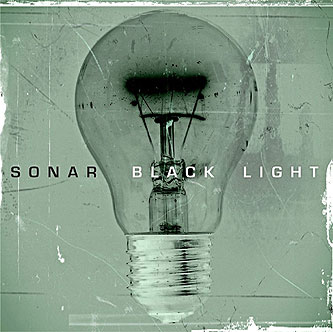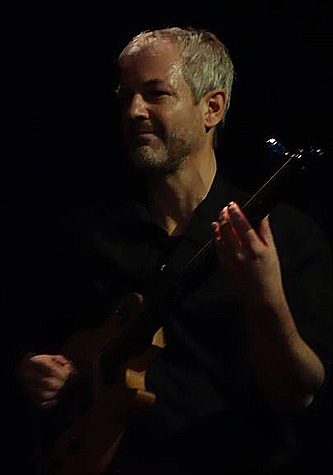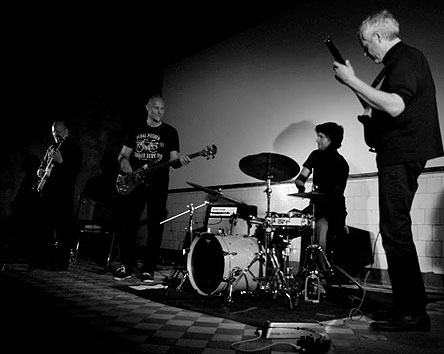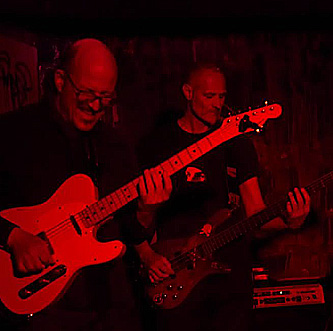 The
third CD from Swiss band Sonar is their second release on Cuneiform
and it’s another amazing album. Sonar are masters at controlling
the high-velocity energy of guitar-centric fusion music. Like a Swiss
watch tells time, the motions and movements of Sonar are carefully
controlled guitar experiments. On the 2015 release of Black
Light, Sonar guitarists Stephan Thelen and Bernhard
Wagner are joined by bassist Christian Kuntner and drummer
Manuel Pasquinelli and the results are emblematic of just how
precise and well rehearsed the Sonar machine is. Thelen cites early
influences from minimalist Steve Reich while others have described
them as creating a kind of “Zen-funk” sound as it relates
to minimalist guitar fusion. On Black Light, Sonar receives
some expert production advice from producer David Bottrill,
who worked with King Crimson in the past. Connections to King Crimson,
especially the post 1980’s band, exist in the sound of Black
Light as well. As the CD progresses from track to track it’s
equally evident that Black Light will find a home with fans
of both King Crimson as well as KC guitarist Robert Fripp. Black
Light is a sonically riveting album filled with mesmerizing instrumental
guitar fusion workouts. Also from the in depth Black Light liner
notes, group founder Thelen adds, “Music must get under your
skin and have an emotional impact, otherwise it’s worth nothing.”
Black Light will take you deep into Sonar’s expansive
sonic stratosphere.
The
third CD from Swiss band Sonar is their second release on Cuneiform
and it’s another amazing album. Sonar are masters at controlling
the high-velocity energy of guitar-centric fusion music. Like a Swiss
watch tells time, the motions and movements of Sonar are carefully
controlled guitar experiments. On the 2015 release of Black
Light, Sonar guitarists Stephan Thelen and Bernhard
Wagner are joined by bassist Christian Kuntner and drummer
Manuel Pasquinelli and the results are emblematic of just how
precise and well rehearsed the Sonar machine is. Thelen cites early
influences from minimalist Steve Reich while others have described
them as creating a kind of “Zen-funk” sound as it relates
to minimalist guitar fusion. On Black Light, Sonar receives
some expert production advice from producer David Bottrill,
who worked with King Crimson in the past. Connections to King Crimson,
especially the post 1980’s band, exist in the sound of Black
Light as well. As the CD progresses from track to track it’s
equally evident that Black Light will find a home with fans
of both King Crimson as well as KC guitarist Robert Fripp. Black
Light is a sonically riveting album filled with mesmerizing instrumental
guitar fusion workouts. Also from the in depth Black Light liner
notes, group founder Thelen adds, “Music must get under your
skin and have an emotional impact, otherwise it’s worth nothing.”
Black Light will take you deep into Sonar’s expansive
sonic stratosphere.
www.Sonar-Band.ch
mwe3.com presents an interview with
Stephan Thelen of SONAR
 mwe3:
When and where was the music for Black Light written and recorded?
From the writing and recording to the production, did you have some
set parameters on Black Light to create something new and different
from the first two Sonar albums?
mwe3:
When and where was the music for Black Light written and recorded?
From the writing and recording to the production, did you have some
set parameters on Black Light to create something new and different
from the first two Sonar albums?
Stephan Thelen: The music on Black Light was mainly
composed after the release of our 2nd album Static Motion.
At first, we wanted to use the same studio as for the recording of
Static Motion. For that album, we traveled to a remote island
called Giske in Norway, where there’s a great studio called Ocean
Sound Recordings. But instead, mainly because Christian (the bass
player) had recently become a father, we decided to remain in Switzerland
and booked a studio just outside of Zürich called Powerplay,
where the album was recorded between January 2nd and January 5th 2015.
We knew that the music would be heavier than the music on Static
Motion and that the new album should be shorter and more concise.
We also wanted to work with an outside producer, which was new for
us. My first choice was David Bottrill, mainly because of his work
with Peter Gabriel, Tool and Sylvian/Fripp. Luckily, David immediately
agreed to join us and flew from Toronto to Zürich on the first
day of 2015. David did the mixing in February/March at his own studio
in Toronto, constantly updating his mixes until all of us were happy
with the results.
mwe3: What was it like working with producer David Botrill?
What did David bring to the sound and what did you look for in a producer
this time and who else was involved in the shaping of the Black
Light sound?
Stephan Thelen: David was a perfect choice for us. He is a
producer that listens carefully to what you want and will help you
find what you are looking for. He always has good suggestions, but
has no ego problems if you don’t want to use them. He was with
us on every step of the recording, like a fifth band member. His main
input on the sound was during mixing and you can easily hear that
he definitely made it more compact and powerful. Another important
factor was the mastering, which was masterfully done by John Cuniberti,
who was recommended to us by our good friend Anil Prasad.
 mwe3:
What about the guitars and amps you’re playing on Black Light.
You recorded the first Sonar album, A Flaw Of Nature with
a Steinberger and Les Paul Custom played through a Fender Mustang
III amp. What’s new in the guitar world for you? Is music becoming
too computerized these days or did you use any other kind of sound
shaping tools such as effects or modelers on the Black Light CD?
The sound of Black Light is very clean and pure sounding.
mwe3:
What about the guitars and amps you’re playing on Black Light.
You recorded the first Sonar album, A Flaw Of Nature with
a Steinberger and Les Paul Custom played through a Fender Mustang
III amp. What’s new in the guitar world for you? Is music becoming
too computerized these days or did you use any other kind of sound
shaping tools such as effects or modelers on the Black Light CD?
The sound of Black Light is very clean and pure sounding.
Stephan Thelen: Part of Sonar’s concept is to use only
clean guitar sounds. I absolutely love the sound of distorted guitars,
but one day, it just suddenly felt too cheap and too easy to just
switch on a box to get this wall of sound. I was more interested in
compositional ideas that generate the same effect but with simpler
means. It all goes back to a Steve Reich quote, which really was important
for me. He said that – for instance – if you are interested
in Sitar music, you shouldn’t just go out and a buy a Sitar and
some Indian clothes, that’s cheap and superficial. Rather, you
should study the music carefully and find out which ideas are
behind the music. Then, you can adapt these ideas in the context of
the culture that you grew up in, and really come up with something
new and original. If you listen carefully to Steve Reich’s music,
you can always hear the ideas of other cultures, but the instruments
he uses are always Western instruments.
For Black Light, we went straight into the mixing desk: Bernhard
played his Telecaster through a Line 6 Pod HD and I played my rebuilt
Steinberger through a Kemper profiler amp. Live, we both still use
the Fender Mustang III amps, because they are reliable and light.
There is exactly one effect that we both use extensively, a Strymon
Blue Sky reverb unit. And if I tell you that we also used a capo for
the first time, you will probably notice how much weight even simple
and little things have in the world of Sonar.
 mwe3:
Sonar is going against the grain of “progressive rock” in
2015 yet the prog-rock crowd seems to take an avid interest in Sonar.
Most prog bands seem to be more interested in the song-driven classic
rock sound but Sonar seems to be going in a completely different direction,
bringing instrumental, avant garde, guitar-scapes into the realm of
prog. Is that how you see Sonar in 2015? What’s been the reaction
among fans to Black Light and Sonar’s unique update on
King Crimson-esque instrumental rock?
mwe3:
Sonar is going against the grain of “progressive rock” in
2015 yet the prog-rock crowd seems to take an avid interest in Sonar.
Most prog bands seem to be more interested in the song-driven classic
rock sound but Sonar seems to be going in a completely different direction,
bringing instrumental, avant garde, guitar-scapes into the realm of
prog. Is that how you see Sonar in 2015? What’s been the reaction
among fans to Black Light and Sonar’s unique update on
King Crimson-esque instrumental rock?
Stephan Thelen: We didn’t plan to be a prog rock band
at all. I am equally interested in progressive rock music, jazz, classical
music, minimal music and the avant-garde. So, in a way, we were surprised
when the most favorable reaction came from the prog scene. We originally
thought that Sonar might have the strongest appeal to a jazz audience,
which it does, but only to a certain degree. But the strongest reactions
have in fact been from people who love instrumental and progressive
rock.
Personally, my favorite response is from people who realize that our
music isn’t about “math rock” but that we are a very
passionate band, even if it is a dark and mysterious kind of passion.
“Sonar explores deep dark corners of the psyche in a manner
that few other groups are capable of” was what one writer
wrote. It’s so beside the point to call us an intellectual band,
our music is much more about process and development. Another response
I really appreciated was: "I'm not sure what just happened,
but this is one of the most inspiring things I ever listened to. I
had my head full of strange and surreal imagery just because of this
completely unique approach of unconventional music. I felt like being
caught in a labyrinth of melodies, haunted by 'the unknown.”
This was actually my main goal with Sonar: to let the audience
re-experience the mysterious and forgotten feelings of hearing music
for the first time.
 mwe3:
I was very impressed with the side project by Sonar drummer Manuel
Pasquinelli called Akku. What did you think of the Akku album and
what other artists are currently catching your ears? Will there be
other side projects by Sonar members in the future
mwe3:
I was very impressed with the side project by Sonar drummer Manuel
Pasquinelli called Akku. What did you think of the Akku album and
what other artists are currently catching your ears? Will there be
other side projects by Sonar members in the future
Stephan Thelen: I love the new Akku album too and I think there
are quite a few other Swiss bands and musicians that are extraordinary
in many ways, e.g. Schnellertollermeier, Nik Bärtsch’s Ronin,
Don Li and Plaistow. Norway is also another country where very interesting
new music is coming from. I have started to work on my next solo album
(working title: Fractal Guitar) on which I will use effects
again, especially delays, in a hopefully new and original way. Manuel
will play drums on that album and there will also be a few guests
including Markus Reuter and Matt Tate, a touch guitarist from Chicago.
mwe3: What did you think of the return of King Crimson and
is KC still the benchmark for progressive experimental rock in 2015?
Has Robert Fripp made any favorable statements about Sonar’s
releases yet?
Stephan Thelen: No, I haven’t heard from Robert in a very
long time and I think he doesn’t usually comment on the work
of other musicians, a fact that I can totally respect. I think King
Crimson was the best band in the world from 1972 – 1974. What
that band did during that period was absolutely daring, cutting-edge
and truly progressive. I haven’t really heard the 2015 septet
yet, but it doesn’t seem to be a very experimental band, rather
a band that wants to have fun playing a repertoire of mainly pre-1974
music, which is absolutely fine and probably very entertaining. Of
course, one could argue that King Crimson has now become the dinosaur
that Robert warned us about in 1974…
mwe3: What were some of the most memorable concerts by Sonar
over the past year or so? I remember you saying how great your 2013
shows were in the U.S. and the U.K. Are some shows better than others
for you?
 Stephan
Thelen: Yes, from my point of view, some shows are better than
others. It depends on a lot of things, the audience, the venue, the
sound, the mental and physical state of the players, etc. The best
Sonar concert for me - musically at least - was probably in a small
jazz venue last year in Liechtenstein, where I lived as a teenager.
The band was very concentrated and relaxed, the audience attentive
and enthusiastic. In the quiet parts, you could literally hear a pin
drop and in the loud parts, the whole venue took off into another
galaxy.
Stephan
Thelen: Yes, from my point of view, some shows are better than
others. It depends on a lot of things, the audience, the venue, the
sound, the mental and physical state of the players, etc. The best
Sonar concert for me - musically at least - was probably in a small
jazz venue last year in Liechtenstein, where I lived as a teenager.
The band was very concentrated and relaxed, the audience attentive
and enthusiastic. In the quiet parts, you could literally hear a pin
drop and in the loud parts, the whole venue took off into another
galaxy.
mwe3: How loud is too loud for Sonar? Do you like to play loud
or do the more intricate moments of Sonar’s music dictate a kind
of more delicate type of performance? Is it difficult to balance the
two sides, the intricate and the powerful?
Stephan Thelen: In the ideal case, I like to use the full dynamic
range: having parts where you barely hear what we are playing to parts
which are loud, full-blast, wild and ecstatic. Too loud is when it
hurts the ears. Sometimes, we can’t play as loud as we would
like to, but we can adapt quite well to any performance situation.
We have successfully played in living rooms in front of 10 people
as well as on big stages in front of 1000 people.
 mwe3:
The cover art of Black Light is incredible. What can you tell
us about the cover art of Black Light? Seems like Sonar gives
careful attention to all artwork associated with the band and their
releases.
mwe3:
The cover art of Black Light is incredible. What can you tell
us about the cover art of Black Light? Seems like Sonar gives
careful attention to all artwork associated with the band and their
releases.
Stephan Thelen: Yes, the artwork is important and should mirror
the aesthetic of the music. I have always loved negative and solarized
images, so my very first idea for the Black Light cover was
to have a negative image of some source of light, so that the light
itself was black. In the beginning, I was reluctant to use the image
of a light bulb, because that has been done before by other artists.
But the rest of the band loved the image that is now on the front
cover so much that they eventually convinced me to use it.
mwe3: What are some of the challenges in moving forward with
Sonar in 2016? Are you looking and hoping for new musical breakthroughs
with your new music, perhaps as a follow up to Black Light or
another project, in the future?
 Stephan
Thelen: Our aim for 2016 is to play live as much as possible,
to write new music and to look into some possible projects with other
musicians and artists. We are not consciously thinking about a follow
up yet, but I’m quite sure that new music will appear that we
will eventually want to record in a not too distant future.
Stephan
Thelen: Our aim for 2016 is to play live as much as possible,
to write new music and to look into some possible projects with other
musicians and artists. We are not consciously thinking about a follow
up yet, but I’m quite sure that new music will appear that we
will eventually want to record in a not too distant future.



